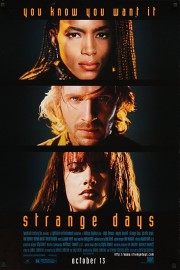Strange Days
Even if you don’t really like James Cameron, you can’t say that he doesn’t know his shit when it comes to technology. With films like “Titanic,” “The Abyss,” “Terminator 2: Judgement Day,” and “Avatar” he’s taken movie technology to new levels of artistry and expanded what’s possible. With his screenplay for ex-wife Kathryn Bigelow’s “Strange Days” however, he shows himself a prophet of the entire web voyeur phenomenon.
It’s December 30, 1999 and Los Angeles is in chaos. A perfect time for a dealer like Lenny Nero (Ralph Fiennes). A former cop, Nero now deals in in human behavior, recorded for our pleasure through a SQUID device that we wear on our head so that the person watching can experience what the recorder experienced. Sex, violence, crime or just a day in the life of. The hotter the experience in the rush it gives off, the more Lenny will pay for it. What Lenny doesn’t deal in is snuff (where someone dies if you aren’t aware). But in this hot bed environment, one such clip (showing the assassination of a politically-volatile rapper) is going to change everything.
After her Oscar-winning achievement “The Hurt Locker,” “Strange Days” is Bigelow’s boldest and best film. She creates a vivid apocalyptic vision of life on the brink of the millennium; as Y2K approached, weren’t we told that this type of thing was gonna actually happen? It helps that she’s working with Cameron’s best-ever screenplay (co-written by occasional Scorsese collaborator Jay Cocks). True, even films like “Point Break,” “K-19: The Widowmaker,” and “Blue Steel” have a genuine intelligence and simple style that Bigelow never really got credit for until “Hurt Locker,” but “Strange Days” required more… and got it. What Cameron envisioned was a world on the brink: paranoid, dangerous, visceral, and provocative. Morality is largely a thing of the past; a perfect time for Lenny, except when it comes to Faith (a sleazed-up but sexy Juliette Lewis), his musician ex-girlfriend who’s now with Philo Grant (the wicked, always gravely-voiced Michael Wincott), who managed the assassinated rapper (Jericho One, played by Glenn Plummer). But that’s just part of the puzzle: there’s also Max (Tom Sizemore, always tough and hard-to-read), Lenny’s PI friend who has been hired by Philo to watch Faith; Vincent D’Onofrio and William Fichtner as corrupt cops, whose determination is not unlike Robert Patrick’s Terminator in “T2”; and Angela Bassett as “Mace,” a limo driver and single mom who’s known Lenny since her no-good husband was picked up by the cops (Mace is also another in Cameron’s long line of strong female characters, which is no doubt why they were able to get Oscar-nominee Bassett to play her, and like a force of nature I might add).
The plot gets pretty complicated by different subplots– especially by a twisted murderer who jacks in his victims to get Lenny’s attention –but Bigelow (aided by Graeme Revell’s intense score and cinematographer Matthew F. Leonetti’s hallucinatory images) keeps things moving at a breakneck pace that matches the tone and energy of the film. And Fiennes (who was just coming off of his Oscar-nominated turns in “Schindler’s List” and “Quiz Show”) is just the star this film needed: like his villainous Nazi in that masterpiece, Lenny is charismatic and wickedly smart, but vulnerable to even the most revealing human emotions like love (he’s still hung up on Faith, although only near the end do we see the depth of those feelings). Fiennes has continued to turn in complex and powerful performances in films as varied as “The Reader,” “The Constant Gardner,” “Spider,” and as Voldemort in the “Harry Potter” films, but the early excitement he built in these early performances hasn’t been equaled since. That’s not meant as a criticism, but as a way of pointing out how fearless Fiennes was at the start… and continues to be.










